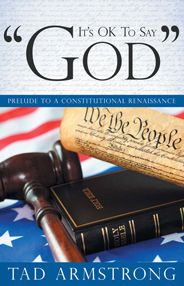17 Mar 2016
What Qualifies a Supreme Court Nominee for Confirmation?
A seldom heard message on judicial review.
Tad Armstrong
There are so many moving pieces to this election year puzzle. It makes it hard to choose which of several serious issues to address first.
Let’s start with media abuse (on the right and the left) of the role the Senate plays in the confirmation process. According to most of them, the Senate has a duty to confirm whomever a President nominates as long as he is “qualified,” but what does that mean? Last night on Fox News Megyn Kelly labeled Obama’s Supreme Court nominee, Merrick Garland, as “incredibly qualified,” implying, however, that he would “nevertheless” not likely be confirmed by a Republican Senate because the process has become more about ideology and power politics than “qualifications.”
In order to determine the responsibility of the Senate, we should take a look at what the Constitution says about the topic. I do not address the Mitch McConnell-led drive to deny Garland a hearing. Although I strongly disagree with this political tactic, it is, after all, a form of rejection within the power of the majority party to enforce. Rather, I address the matters the Senate should look to in deciding whether to confirm or reject a nominee, whether by denial of a hearing or rejection after a hearing.
If you do not know the qualifications to become President, you should. They are found in Article II, §1. Click the Constitution tab on my website, ellconstitutionclubs.com, and read them. Ditto for the qualifications to become a United States Senator or Representative. See Article I, §§ 2 and 3, respectively.
Surely the Constitution sets out the qualifications to become a Supreme Court Justice? Right? Wrong. Do you have to be a United States citizen? No. A non-felon? No. A lawyer? No. Can you be 18 years of age? Yes. The Framers trusted the power to seat a Justice to the combined wisdom (repeating, “combined” wisdom) of the President and a majority of the Senate. Here’s the math:
Nomination by the President + Confirmation by a majority vote in the Senate + the President’s willingness to then make the official Appointment = A Brand New Robe (who holds office for life).
So, where should a Senator turn to determine whether Merrick Garland is, according to Ms Kelly (and all other media folks, by the way), “incredibly qualified”?
I would suggest a proper guide to the Senate’s role should begin with the definition of “qualification”: “a quality or accomplishment that makes someone suitable for a particular job or activity.”
So, Megyn, if, by “incredibly qualified,” you mean a nominee must graduate from Hawvud, be a lawyer, be a judge and have experience at both, one supposes that a President would not likely ever nominate someone without those (or similar) credentials. Is it, then, a Senator’s duty to confirm based upon general concepts of “qualification” or did the Framers have something more substantial in mind? I suggest the latter because, folks, really, no nominee would likely ever fail such a broad test. There must be a more significant reason why the Senate’s approval was made mandatory. Surely it wasn’t to prevent a President from appointing a foreign national, a convicted felon or a 20-year-old high school graduate. Otherwise, why require Senate approval at all? Words have meaning.
But, there is a requirement, albeit after confirmation, that bears heavily upon the duty of a Senator in deciding whether to confirm a nominee. Before taking office, a Supreme Court appointee must first take something else — an oath to support the Constitution. See Article VI.
Perhaps the definition of an oath might be of some value, as well: “a solemn promise regarding one’s future action” – in this case, one’s future action to support the Constitution. Sounds serious enough to be a “qualifier” to me. How about you?
Well, how does one determine whether a nominee is likely to take his oath seriously? Decidedly not by asking him questions at a hearing made for television where Senators get free facetime and the nominee either refuses to answer what his future determination of an issue might be or frequently lies in order to get confirmed. See my St. Louis Post-Dispatch op-ed on my blog at https://www.ellconstitutionclubs.com/elena-kagan-and-the-rule-of-law-188 regarding Justice Kagan’s nomination hearings. I have no use for confirmation hearings in their present form.
The only reasoned measure of a would-be oath-taker’s credibility is his past record. No need for facetime. No need for false promises. No need for showmanship. Show me how serious you have been with your oath in the past, Mr. Nominee. Instead of a hearing, the Senate should perform an investigation by looking to his written track record and asking others who know him relevant questions, but not by asking him a thing.
Megyn and everyone else calls this inquiry a political look at a person’s ideology. The media views Justices Breyer, Sotomayor, Ginsburg and Kagan as “liberals” who believe in a “living, breathing Constitution” and Justices Scalia (recently deceased), Alito, Thomas and Roberts as “conservatives,” meaning old fogies, wedded to an outdated piece of parchment. Justice Kennedy arguably falls into both camps; however, since I view proper judicial review a bit differently, I have to place Kennedy in with the so-called “liberal” crowd. An oath is meaningless unless consistently followed.
The media does not use the term “ideology” in the oath-taking sense. I view these two camps on the Court, not as conservatives or liberals, but as oath-takers and oath-breakers, respectively. The former are “incredibly qualified” to be on the Court – the latter should be impeached or, better yet, should never have been fitted for a robe. Too harsh? I can show you case after case where the oath-breakers look to opinion polls, societal trends, laws of other nations, attitudes of the United Nations and their own independent view of what America should look like as their only guidance in rendering a decision that affects us all. That is a legislative function, not a judicial one. Please understand that when a decision dismisses the text or intent of the Framers concerning a constitutional question, that, by definition, is the polar opposite of a solemn oath to support it. That form of jurisprudence results in amendments to our Rule of Law without the consent of the people. It is destructive to our Republic and the precursor of totalitarianism.
The oath-takers believe their job starts with the text of the Constitution and, if necessary, ends with the intent of the text garnered from the historical account of the text. That is, after all, in the nature of a solemn oath to support it – a solemn oath to the American people not to abuse the awesome power they hold.
As an aside, I take the view that the Scalia-types are the ones that believe in a “living, breathing” Constitution. The Framers knew that succeeding generations might view things differently and, therefore, they gave us Article V – the proper way, if enough Americans see fit, to amend the Constitution. It is as alive as the American people wish it to be.
Is Merrick Garland “incredibly qualified” for the office of Supreme Court Justice? He ruled against the right of a D.C. resident to own a gun to defend himself in his home. He ruled against the 2nd Amendment. If he gets on the High Court, he, along with the existing oath-breakers, will reverse the Heller decision, thus empowering cities, states and the United States government to confiscate your guns. He appears to be “incredibly qualified” to give a speech on how he views the world and to teach at Hawvud. In that context, his opinions may be worthy of consideration. In the context of his wannabe position on the Supreme Court, he does not qualify – not because he is a liberal thinker with a liberal ideology, but because he doesn’t understand the meaning of a solemn promise to stay within his constitutionally limited power.
On the foregoing basis alone, if I were a Senator, I wouldn’t need a hearing to reject him. Politically, that might be a mistake if Hillary somehow takes up residence at 1600 Pennsylvania Avenue and the Democrats take over the Senate. In that event, we might even see a Justice Obama or Justice Holder donning robes someday. Folks, if a so-called “moderate” or “liberal” replaces Antonin Scalia or future vacancies, your constitutional rights will be in serious jeopardy. That is why this election is so important.
My fear is that too many Americans are willing to give blood bought freedom away for nothing because they do not have the knowledge necessary to an understanding of the precious freedoms they presently possess found in our Constitution. The stakes are higher than they have ever been in my lifetime.
Please go to my website at www.ellconstitutionclubs.com and consider joining my mailing list. My free newsletter will keep you informed without inundating you with a torrent of overwhelming emails.

Comments











Lovely just what I was looking for.
Thanks for this post, I am a big big fan of this website would like to keep updated.
I like this website because so much utile stuff on here : D.
I simply wanted to type a simple note in order to say thanks to you for these fabulous items you are placing on this site. My rather long internet look up has at the end been recognized with professional facts and techniques to share with my good friends. I ‘d express that we visitors actually are very fortunate to dwell in a decent website with very many marvellous people with very beneficial things. I feel very much fortunate to have seen your web pages and look forward to some more amazing moments reading here. Thanks again for a lot of things.
Thank you so much. So encouraging. I have been awol for a time, but comments like this give me new life. Please sign up for our free newsletter on the homepage. I promise to make it worth your time. Tad Armstrong
An interesting dialogue is price comment. I think that it is best to write more on this topic, it might not be a taboo subject however typically persons are not sufficient to talk on such topics. To the next. Cheers